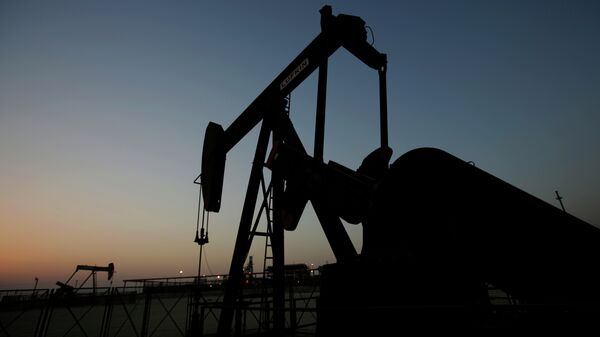MOSCOW (Sputnik), Yulia Shamporova —The Organization of the Petroleum Exporting Countries (OPEC) has failed to maintain the oil price levels needed to support its member states’ budgets, and will not be able to enforce these prices due to competition from North American shale producers and the new Iranian crude supply, experts told Sputnik on Thursday.
Global oil prices have dropped significantly so far in the second half of 2015 compared to summer 2014, falling from $100 to $43 per barrel for Brent crude — primarily a result of oversupply in the global market. In late July, OPEC said it would not decrease oil production, keeping its production level at 30 million barrels per day.
"OPEC is no longer the major swing producer at the oil price levels needed to support the member’s domestic budgets. It will likely continue to exist but cannot effectively/sustainably enforce the prices needed by its members because of competition from North American shale producers," Adam Perdue, an economist at the UH Bauer Institute for Regional Forecasting, said, adding that there will be even more acute difficulties ahead due to the reemergence of Iranian oil.
According to the expert, crude prices will hover at $40-60 per barrel through 2016. Attempts to change this trend will be countered by the production of shale gas in North America.
OPEC will not cease to exist, but is largely dysfunctional, Giovanni Staunovo, commodities analyst at UBS, told Sputnik.
"While the financially weaker members, such as Venezuela, Ecuador and Nigeria, would like to see the cartel adhering to the production ceiling, the members from the Middle East will likely focus on keeping or increasing production," Staunovo said.
The expert also pins the prices at $40-60 per barrel in the short run, but expects them to increase to $70 within a year.
"Risks to our positive view come from a sharp increase in OPEC crude production and/or weaker oil demand from an emerging Asia in 2016," Staunovo added.
Another factor that could change the situation in the oil market is the return of Iran as an exporter, experts claimed.
Last month, Iran and six world powers reached a deal lifting the sanctions against the Islamic Republic, including the oil trade embargo, in exchange for assurances of the safe nature of its nuclear program.
Prior to the introduction of the anti-Iran sanctions in 2012, the European Union was purchasing more than half a million barrels of Iranian oil per day.




